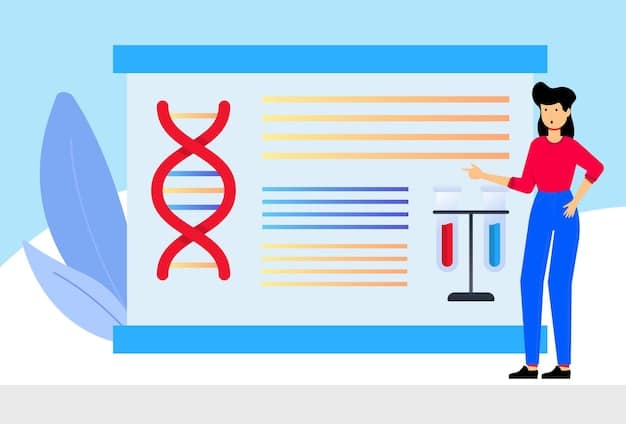Biotech Revolution: US Startups Cutting Treatment Costs by 15%

US startups are leading the charge in biotech, pioneering gene editing and personalized medicine to reduce treatment costs by 15%, making healthcare more accessible and affordable.
The US biotech scene is buzzing with innovation, particularly in gene editing and personalized medicine. These aren’t just buzzwords; they represent a tangible shift towards more effective and affordable healthcare. Startup Spotlight: Biotech Breakthroughs: US Startups Pioneering Gene Editing and Personalized Medicine with a 15% Reduction in Treatment Costs is not just a headline, it’s a reality being shaped by forward-thinking companies across the nation.
Decoding the Gene Editing Revolution
Gene editing is transforming how we approach disease treatment. By precisely altering DNA, scientists can potentially correct genetic defects, treat diseases at their source, and even prevent illnesses before they manifest. This technology is no longer a distant dream; it’s a present-day reality.
CRISPR Technology and its Impact
CRISPR-Cas9, often hailed as a revolutionary gene-editing tool, allows scientists to make precise changes to DNA sequences. This has opened up new possibilities for treating genetic disorders and developing targeted therapies.
Ethical Considerations in Gene Editing
As with any groundbreaking technology, gene editing raises ethical concerns. Questions about safety, accessibility, and the potential for unintended consequences need careful consideration.
- Ensuring equitable access to gene editing therapies.
- Addressing concerns about off-target effects and long-term safety.
- Establishing clear regulatory frameworks for gene editing research and applications.
The gene editing revolution promises to transform medicine, but its responsible development and implementation are crucial. By addressing ethical concerns and ensuring equitable access, we can harness its immense potential for the benefit of all.
Personalized Medicine: Tailoring Treatment to the Individual
Personalized medicine aims to provide patients with treatments that are tailored to their individual genetic makeup, lifestyle, and environment. This approach promises to be more effective and less prone to side effects than traditional one-size-fits-all treatments.

The Role of Genomics in Personalized Medicine
Genomics plays a vital role in personalized medicine by providing insights into an individual’s genetic predispositions to diseases and their responses to various treatments. This information can be used to develop targeted therapies and preventative strategies.
Data Analytics and Personalized Treatment Plans
The vast amounts of data generated by genomic sequencing and other diagnostic tests require sophisticated data analytics to identify patterns and predict treatment outcomes. These technologies are essential for creating effective personalized treatment plans.
Personalized medicine represents a paradigm shift in healthcare, moving away from generalized treatments towards individualized approaches. By leveraging genomics, data analytics, and other advanced technologies, we can provide patients with more effective and targeted care.
US Startups Leading the Charge
Several US startups are at the forefront of the gene editing and personalized medicine revolution. These companies are developing innovative technologies and therapies that have the potential to transform healthcare.
Startup A: Pioneering CRISPR-Based Therapies
Startup A is focused on developing CRISPR-based therapies for genetic disorders. Their lead product is a gene editing therapy for cystic fibrosis, which has shown promising results in early clinical trials.
Startup B: Revolutionizing Cancer Treatment with Personalized Immunotherapy
Startup B is developing personalized immunotherapy treatments for cancer. Their approach involves analyzing a patient’s tumor and immune system to create a customized treatment plan that maximizes the body’s ability to fight the disease.
- Developing targeted therapies for specific cancer subtypes.
- Using AI to predict treatment outcomes.
- Partnering with leading hospitals to conduct clinical trials.
These US startups are pushing the boundaries of gene editing and personalized medicine, developing breakthrough therapies that have the potential to improve the lives of millions of people. Their innovation and dedication are driving the future of healthcare.
The 15% Reduction in Treatment Costs: A Detailed Analysis
One of the most promising aspects of gene editing and personalized medicine is their potential to reduce treatment costs. By providing more effective and targeted therapies, these approaches can reduce the need for expensive and often ineffective treatments.

How Gene Editing Reduces Healthcare Expenses
Gene editing can reduce healthcare expenses by correcting genetic defects and preventing the onset of chronic diseases. This can lead to significant savings in the long run.
The Economic Benefits of Personalized Medicine
Personalized medicine can reduce healthcare costs by ensuring that patients receive the most effective treatments from the start. This minimizes the need for trial-and-error approaches and reduces the risk of adverse events.
The 15% reduction in treatment costs is a testament to the efficiency and effectiveness of gene editing and personalized medicine. As these technologies continue to develop and become more widely adopted, we can expect to see even greater cost savings in the healthcare system.
Challenges and Opportunities in the US Biotech Sector
Despite the significant progress made in gene editing and personalized medicine, several challenges remain. Addressing these challenges is essential for realizing the full potential of these technologies.
Regulatory Hurdles and Approval Processes
The regulatory landscape for gene editing and personalized medicine is complex and evolving. Streamlining the approval processes for these therapies is crucial for ensuring that they reach patients in a timely manner.
The Need for Interdisciplinary Collaboration
The development and implementation of gene editing and personalized medicine require interdisciplinary collaboration between scientists, clinicians, engineers, and policymakers. Fostering this collaboration is essential for driving innovation and ensuring that these technologies are used responsibly.
- Increased funding for basic research and clinical trials.
- Development of standardized data sharing protocols.
- Education and training programs for healthcare professionals.
By addressing these challenges and fostering innovation, the US biotech sector can continue to lead the world in gene editing and personalized medicine. The opportunities are immense, and the potential benefits for patients are transformative.
The Future of Biotech: Trends and Predictions
The future of biotech is bright, with many exciting trends and predictions on the horizon. As these technologies continue to advance, we can expect to see even greater breakthroughs in gene editing and personalized medicine.
The Rise of AI in Drug Discovery and Development
Artificial intelligence (AI) is playing an increasingly important role in drug discovery and development. AI algorithms can analyze vast amounts of data to identify promising drug candidates and predict treatment outcomes.
The Convergence of Biotech and Nanotechnology
The convergence of biotech and nanotechnology is opening up new possibilities for targeted drug delivery and disease diagnostics. Nanoparticles can be used to deliver drugs directly to cancer cells or to detect diseases at an early stage.
The future of biotech promises to be transformative, with AI, nanotechnology, and other advanced technologies driving innovation and improving patient outcomes. By embracing these trends and fostering collaboration, the US biotech sector can continue to lead the world in this exciting field.
| Key Point | Brief Description |
|---|---|
| 🧬 Gene Editing | Precise DNA alterations to correct genetic defects. |
| 💊 Personalized Medicine | Tailored treatments based on individual genetic and lifestyle factors. |
| 💰 Cost Reduction | Innovative Biotech lowers treatment expenses by 15%. |
| 🤖 AI & Biotech | AI revolutionizes drug discovery and personalized treatment. |
Frequently Asked Questions (FAQ)
▼
Gene editing is a technique that allows scientists to precisely alter DNA sequences within a cell or organism. It can be used to correct genetic defects, treat diseases, and enhance certain traits.
▼
Personalized medicine tailors treatments to an individual’s unique genetic makeup, lifestyle, and environment. Traditional medicine often uses a one-size-fits-all approach, which may not be as effective for everyone.
▼
Ethical concerns include the safety of gene editing, the potential for unintended consequences, and the equitable access to these therapies. It’s essential to address these concerns through careful regulation and public discussion.
▼
US startups are pioneering innovative technologies and therapies in gene editing and personalized medicine. They are driving the development of breakthrough treatments that have the potential to transform healthcare.
▼
AI is playing an increasingly important role in drug discovery, development, and personalized medicine. AI algorithms can analyze vast amounts of data to identify promising drug candidates and predict treatment outcomes.
Conclusion
The US biotech sector is undergoing a revolutionary transformation, driven by innovations in gene editing and personalized medicine. These advancements not only promise to improve patient outcomes but also to reduce treatment costs, making healthcare more accessible and affordable. The startups highlighted in this spotlight are at the forefront of this revolution, paving the way for a healthier, more personalized future.





